Stories from the Autism Epidemic
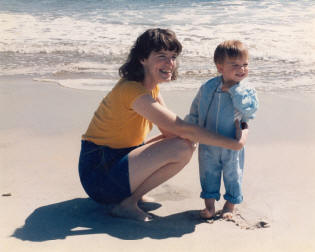
"No Rest for Parsippany Family Warning of Vaccine-Autism Tie" - Media article on the Gallup family by Colleen O'Dea published March 6, 2006 in the Daily Record
Eric's Story and the Autism Epidemic - an open letter to parents from our co-founder, Ray Gallup
"From Here to Delaware" - a short story by Ray's daughter, Julie Gallup at age 16
"My Brother Eric" - a short essay about living with a sibling with autism, by Julie Gallup
"The Wrongs of Disability Rights" - A composition by Julie Gallup
"Can Vaccines Cause Autism?" - Media article by Colleen O'Dea published August 22, 1999 in the Daily Record
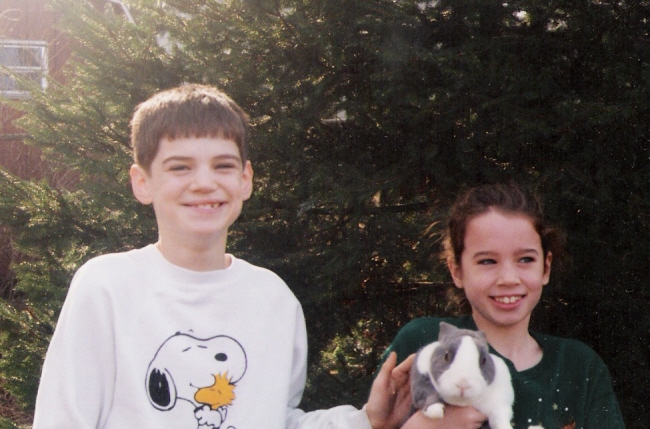
No Rest for Parsippany Family
Warning of Vaccine-Autism Tie
by Colleen O'Dea of the
Daily Record (March 6, 2006)
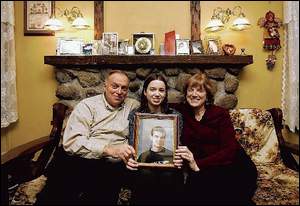
PARSIPPANY -- For Raymond Gallup,
second to the incomprehensible pain of having a son who is autistic is the
frustration of trying to educate the public about his beliefs that a childhood
vaccine was responsible for Eric's autism.
The boy's story is getting a wider audience in an Australian magazine on the
stands now and in a book about speech disorders due out later this year.
"It's been very frustrating," said Gallup of trying to get his son's story
publicized. "There's a lot more activity in the U.K. Over here, they totally
ignore it."
Now 21, Eric Gallup was a typical child from birth until age 15 months. Raymond
Gallup says that after his son received the measles-mumps-rubella MMR vaccine,
he lapsed into autism.
"Looking back at home video-tapes, I could see what happened before and after
the MMR vaccine was given to Eric," wrote Raymond Gallup in the piece in the
current issue of Informed Voice magazine. "His speech was progressing and then
after, nothing."
Gallup founded The Autism Autoimmunity Project in 1998 to raise money for
research and to spread the word about a possible link between vaccination and
autism. Its Web site, www.taap.info includes information and research about
autism.
Autism includes a spectrum of developmental disorders affecting social
interaction, communication, behavior and other brain functions. The national
Centers for Disease Control and Prevention estimates that one in 166 children
have autism. It is more prevalent in boys than in girls.
Incidence on rise
The incidence of autism in the United States has risen exponentially in the last
decade. According to the U.S. Department of Education, 22,664 children age 6-21
in special education programs had autism in 1994. By 2004, that number had
soared to 166,424.
The CDC states that because autism was only added as a special education
category in the early 1990s, "it is unclear how much of this increase is due to
changes in how we identify and classify ASDs in people, or whether this is due
to a true increase in prevalence." Although its actual cause isn't known,
genetic and environmental factors may play a role in autism.
In his article, Gallup disputes such assertions: "I know that the autism
epidemic can't be genetic in nature. There never has been, nor never will be, a
genetic epidemic. Like many parents who know their children, I know that
vaccines are responsible for my son's autism disorder."
A study by British doctors led by Andrew Wakefield published in the British
medical journal The Lancet in 1998 first brought worldwide attention to the
issue. That study found a correlation, but not necessarily a causal relation,
between the MMR and autism. But some of the doctors involved in that study have
since disavowed that.
But the CDC states that most evidence shows no link between vaccines and autism.
It has done two studies, one looking at the MMR and another at thimerosal, a
mercury preservative commonly used in vaccines, and found no link. The CDC plans
additional research on the topic.
The national Institute of Medicine's Immunization Safety Review Committee
released its final report on the question of vaccines and autism in 2004 and
found that the majority of evidence "favors rejection of a causal relationship"
and recommended that "available funding for autism research be channeled to the
most promising areas."
"I fail to understand how in heaven's name, faced with the data, they could have
come to that conclusion," countered Wakefield, a gastroenterologist who is now
based at Thoughtful House in Texas, during a presentation at Carnegie Mellon
University in Pittsburgh last November.
Gallup said few doctors in the United States are doing research on the topic and
those who are, including Wakefield, have difficulty getting funding. He has
sought funding before the National Institutes of Health three times over the
last decade and was denied.
But he has reason to seek additional studies: Two doctors, including James
Oleske, the famous pediatric immunologist specializing in AIDS, found extremely
high measles antibody titers in Eric's blood in 1995.
Statistical association
The research of Wakefield and other doctors has found evidence of the measles
virus in a much higher percentage of the intestines of children with autism and
bowel inflammation, compared with children without autism.
"Again, this is not a causal association, but a statistical association,"
Wakefield told the audience. "There is a convergence of biological evidence
toward causation. We may not be there yet, but this is most certainly not the
time to stop looking."
Statistics seem to show the increase in the incidence of autism beginning around
the same time period as the MMR vaccine. If MMR is a factor in autism, it could
be that the vaccine, which contains live viruses, may only cause harm in
children whose immune systems are compromised at the time they receive the
vaccine, Wakefield said.
While Wakefield and his research had been widely criticized for years in
England, The Daily Mail of London earlier this month reported that a former
British government medical officer responsible for deciding whether medicines
are safe believes that evidence of a connection between the MMR vaccine and
autism is mounting and governmental officials are ignoring it.
"It is the steady accumulation of evidence, from a number of respected
universities, teaching hospitals and laboratories around the world, that matters
here. There's far too much to ignore. Yet government health authorities are, it
seems, more than happy to do so," Fletcher told the Mail.
Profound questions
The new book in which Eric is mentioned and which may feature him on its cover,
"Milestones: Normal Speech and Language Development" by John W. Oller, Stephen
D. Oller and Linda C. Badon, does not take a stand on the question of whether
vaccines may cause autism. The authors' only mention to the cause of autism is
that "profound questions remain about the extent of the genetic factors in the
autism spectrum, and in other pervasive developmental disorders ... and their
potential interaction with environmental factors."
But Raymond Gallup says any exposure has the potential to bring his cause to
light.
"This is a way we can get more publicity, if we can get into an educator's
book," he said. "I hope this will add some clout to the message we've been
trying to get out."
The book, aimed at speech professionals, highlights Eric's case to demonstrate
the expense of caring for an autistic person. In it, Raymond Gallup estimates
the annual cost of caring for Eric today at between $50,000 and $100,000.
Today, Eric is living at a residential school in Delaware because he had become
increasingly violent over the last few years.
"In 2002, Eric started to develop aggressions where he would bite, head-butt,
kick, scratch and pull hair," wrote Raymond Gallup, who is now four inches
shorter than his son. "In February 2003, Eric broke my left index finger with
his teeth almost amputating it off."
Affected sister
Eric's sister Julie Gallup, a student at the Visual and Performing Arts Academy
in Denville, wrote about how her brother's actions affected her.
"As soon as we saw he was getting agitated, we'd run into a room and lock the
door behind us," she wrote on Red Flags, an independent Web site on health
issues. "I couldn't get over the fact that I was actually afraid of my brother.
I knew he was in pain and had no other way to show it. The police were at our
house frequently. Eric was transferred from hospital to hospital, but no place
was right for him. I know it broke my parents' hearts, and mine too, but it was
nearly impossible to give him 24-hour care."
Two years ago, after numerous incidents Eric had to be hospitalized. He spent
time at Greystone Park Psychiatric Hospital but staff there told the Gallups
that it was not the best place for him.
He's been at the residential school for the last 18 months and while his
behavior has improved, he is on strong anti-psychotic and anti-anxiety
medicines. Because his school is more than two hours away, the Gallups are able
to visit only every other weekend. They hope some day to be able to get him
placed in a group home in New Jersey.
"I worry about Eric constantly," Raymond Gallup wrote. "I wonder what his and
our lives would be like if he wasn't damaged by the MMR vaccine."
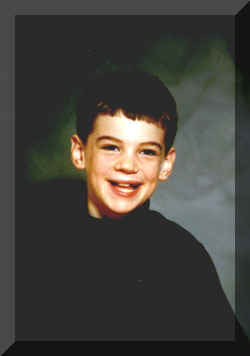
6-30-05
Dear Parents:
I’m writing this not as a doctor with a fancy degree from Harvard or another
school. I’m a parent who graduated from Queens College in 1975 with a B.A. degree in
Economics and served in the U.S. Navy as a radioman in 1966 to 1968. I was born
on June 30, 1944 in St. Albans, Queens, New York. I received the pertussis vaccine
when I was six months old and in the early 1950s I got a case of whooping cough
despite getting the vaccine. In the mid 1950s I got a case of measles and was
out of school for two weeks.
Before I tell my story about my son, Eric Gallup, I want to mention some important facts. Autism is increasing at an alarming rate. Five years ago, it was 1 in 500 that had autism spectrum disorders according to the Centers for Disease Control (CDC). Recently, the CDC and the American Academy of Pediatrics (AAP) said that 1 in 6 children are diagnosed with a developmental disorder and/or behavioral problem. Also, the CDC and AAP said that 1 in 166 children are diagnosed with an autism spectrum disorder.
I have been documenting the autism epidemic from the 1990s using the US Department of Education figures. Here are the latest figures.
I know that the autism epidemic can’t be genetic in nature. There never has been nor never will be a genetic epidemic. Like many parents who know their children, I know that vaccines are responsible for my son’s autism disorder. In Washington DC there is concern about Social Security and Medicare/Medicaid running out of money. The politicians are only thinking of the growing numbers of the elderly putting a strain on system. They don’t realize that in 5 to 10 years from now, there will be a growing number of children with autism that will reach adulthood and will be eligible to collect SSI and Medicare benefits. What will happen then? Will the Federal government have unlimited resources to deal with this crisis. Will the states have unlimited resources to deal with this crisis?
The vaccine link to autism goes beyond the thimerosal and measles-mumps-rubella (MMR) vaccine as far as I’m concerned. Many in the medical establishment and Federal government health agencies deny a vaccine link to autism. Despite the denial, the Food and Drug Administration (FDA) keeps a record of adverse reactions to vaccines. It is called the Vaccine Adverse Event Reporting System (VAERS).
Eric Gallup was
born normal on
In 1995,
Vijendra Singh, PhD. of
See also: http://www.avn.org.au/children/26233B2F-D693-426C-9143-30E91F0C5FC0.html
In April 1995,
September 1997 and November 2001 I went to the National Institutes of Health
(NIH) in
In 2002, we took Eric to see Dr. Arthur Krigsman, a gastroenterologist. Dr. Krigsman found that Eric had colitis and a very painful, quarter-size stomach tissue in Eric’s throat.
In 2002, Eric started to develop aggressions where he would bite, head-butt, kick, scratch and pull hair. Up to February 2004, we had to call the police numerous times and Eric had to be taken to the hospital. He was on various anti-depressant medications over those two years and in February 2003, Eric broke my left index finger with his teeth almost amputating it off. Eric grew to be 6’2” tall and I am 5’10” so he was a handful. We received no respite care from Eric’s school or any state agency. We lived a life of hell and we were under siege during that time. When Eric had an aggression, we would have to go behind our bedroom or bathroom doors and lock them so Eric couldn’t hurt us. Eric broke two bedroom doors by kicking on them and we had to replace them with stronger doors that were kick-proof.
At a
Eric had
aggressions at school and was suspended various times. In February 2004, Eric
was terminated from school and when I took Eric to the store he had another
aggression. The police were called and Eric was taken to the hospital where he
was born and put in their psychiatric unit. After a couple of weeks, we were
told by the hospital that he would either have to be taken home or put in
He was released and taken to Kennedy Krieger Institute where they treated him for his aggressions.
In August 2004 he was released from Kennedy Krieger Institute and was placed in an out-of-state residential school. When we initially left him there, he was running to the door to get out because he wanted to go home with us. Since that time he has gotten better but he is on heavy duty medication such as haldol and adivan. It takes us 2 and ½ hours to drive one way to see Eric so we only see him every other weekend. In January 2005, another patient punched Eric in the eye giving Eric a black eye. Eric was on a couch and pushed the other patient and the patient took exception and punched Eric. I worry about Eric constantly and at times I wonder what his and our lives would be like if he wasn’t damaged by the MMR vaccine. Many a time, I shed a tear for him. In particular, Helen and I had to make funeral arrangements for Eric because the state said they had money for this. It was very morbid and stressful for Helen and I to do this. One person asked me why couldn’t the state do this and not cause us more grief. I had no answer for them.
Many times when we pick up Eric to go out for lunch he will ask us about “home” in his picture/word book. It is difficult to respond to him and we have to say not now. During the last year we have brought Eric home for the weekend but it is difficult for myself emotionally, the fact that Eric is no longer living with us. I’m sure that we won’t be the first family dealing with this. Unfortunately, we won’t be the last family dealing with a situation such as this.
Recently, I had a disagreement over Eric’s medications at the school that he attends. They have him on zyprexa, haldol, adivan and lithium. I asked them to put Eric on extra doses of Vitamin B6 to reduce the tremors he has from the medications. Eric also has drooling problems and he stares off as he is so heavily medicated.
We now have to look for another facility for Eric because of our disagreement. Basically, the state, the education system and the medical community want our children vaccinated. When something goes wrong then none of these organizations are there to help. They leave it in the parent’s hands. It isn’t their problem, it is the problem for the families involved.
The most telling part of the vaccine/autism link controversy is how three researchers who have looked into the autoimmune, MMR vaccine link to autism have been dealt with. This is what has actually happened. Keep in mind that if these researchers were politicians and this happened to them it would be reported all over the media.
Unfortunately because they are independent researchers who are trying to help families and children with autism, their story is ignored
by the media.
Vijendra Singh, PhD of Utah State University has found it difficult to get funding for any studies related to autoimmunity and autism after he discovered and perfected tests that proved an MMR autism connection. Prior to that, funding was easily available to him including from NIH sources.
Famed researcher Andrew Wakefield, MD of London, England, the author of over a hundred scientific articles (and his organization, Visceral (http://www.visceral.org.uk) ) encountered worse persecution. His research was closed down and he was told that he had to leave the Royal Free Academy Hospital in London, England because he found evidence of measles in the gut of children with autism. His career came to a screeching halt in the UK. His phone was electronically bugged and his attackers are still after him, even now that he is in the US. Recently Dr. Wakefield has reported evidence of vaccine-strain measles virus genomic RNA in the cerebrospinal fluid of children with autism. This only accentuated his enemies’ attacks. Obviously all governmental funding had stopped years ago.
Arthur Krigsman, MD of Long Island, New York has replicated Dr. Wakefield’s research in the US. After doing some 250 ileal biopsies of children with autism at Lenox Hill Hospital, he was not allowed to have them further tested for viral genomic RNA. Dr Krigsman was then so restricted that he also had to leave his NY hospital base. The reason is obvious, he was replicating Dr. Wakefield’s clinical science and the powers that be weren’t happy with this. Congressman David Weldon (who is also an MD) asked that the NIH fund Dr. Krigsman’s research. To date, the NIH has not honored Congressman’s request.
Anybody looking at what happened to these researchers can see the obvious. Why do this to these men if people were not afraid of the research they were doing? It basically is a vaccine/autism Watergate cover-up perpetrated by the enemies of these excellent researchers. The sad part about this is that families and children will never be helped and more and more children will develop autism. Who will pay and care for these children when they turn into adults like Eric?
Especially when the parents get older and can no longer care for them. Will they have enough group homes and residential centers to care for the coming adult epidemic of autism? It is a subject that should be addressed now, but unfortunately only when something becomes a crisis is it addressed in the US.
Ray Gallup, parent and Co-founder
p style="text-align: left;">From Here to Delaware
by Julie Gallup (August, 2005)

When you’re growing up, there’s at least one person that will make a drastic impact on your life. My brother, Eric, is the one that stands out. In between watching Sesame Street together, going to the park, and doing puzzles, my love for him has grown. We’ve had our disagreements; but he was always there for me when no one else was. Everything about him wasn’t so flawless though. My brother has autism.
I didn’t know something was wrong with him until we started going out in public. Some people would stare at him like he was an animal gone wild in the zoo when he’d make a noise or run off by himself. I wouldn’t be telling the truth if I said I wasn’t embarrassed. It made me so angry that some people had no tolerance for my brother whatsoever.
Often I felt like the big sister even though he was older than me. It was difficult for him to do certain activities by himself. We helped my parents rake leaves even though most of them would fly off when he tried to put them in the bag. We all took turns reading to him when he wasn’t reading in his own way; flipping through his enormous collection of books, making sure he caught every page. However, when it came to stealing a piece of cake from on top of the refrigerator, he had mastered that.
Eric started getting really aggressive a few years ago. As soon as we saw he was getting agitated, we’d run into a room and lock the door behind us. I couldn’t get over the fact that I was actually afraid of my brother. I knew he was in pain and had no other way to show it. The police were at our house frequently. Eric was transferred from hospital to hospital but no place was right for him. I know it broke my parent’s hearts and mine too, but it was nearly impossible to give him 24-hour care.
We found a residential school in Delaware for Eric. Every other weekend, we take him out for lunch and ice cream (he’d eat all day if you let him). I look out across the water of the park we always stop at. I think about how I used to pray that God would somehow make him normal. Now, I think taking away his autism would take away some of his spirit too. I don’t want to lose that. Eric has given me so much: the patience to deal with others, the ability to love, and accepting people for the way they are. I wouldn’t be who I am today if it wasn’t for him. Deep down, I think he knows this. All I can hope for him is that he lives the best life he possibly can and not let anyone stand in his way. Maybe someday he’ll be able to come home.
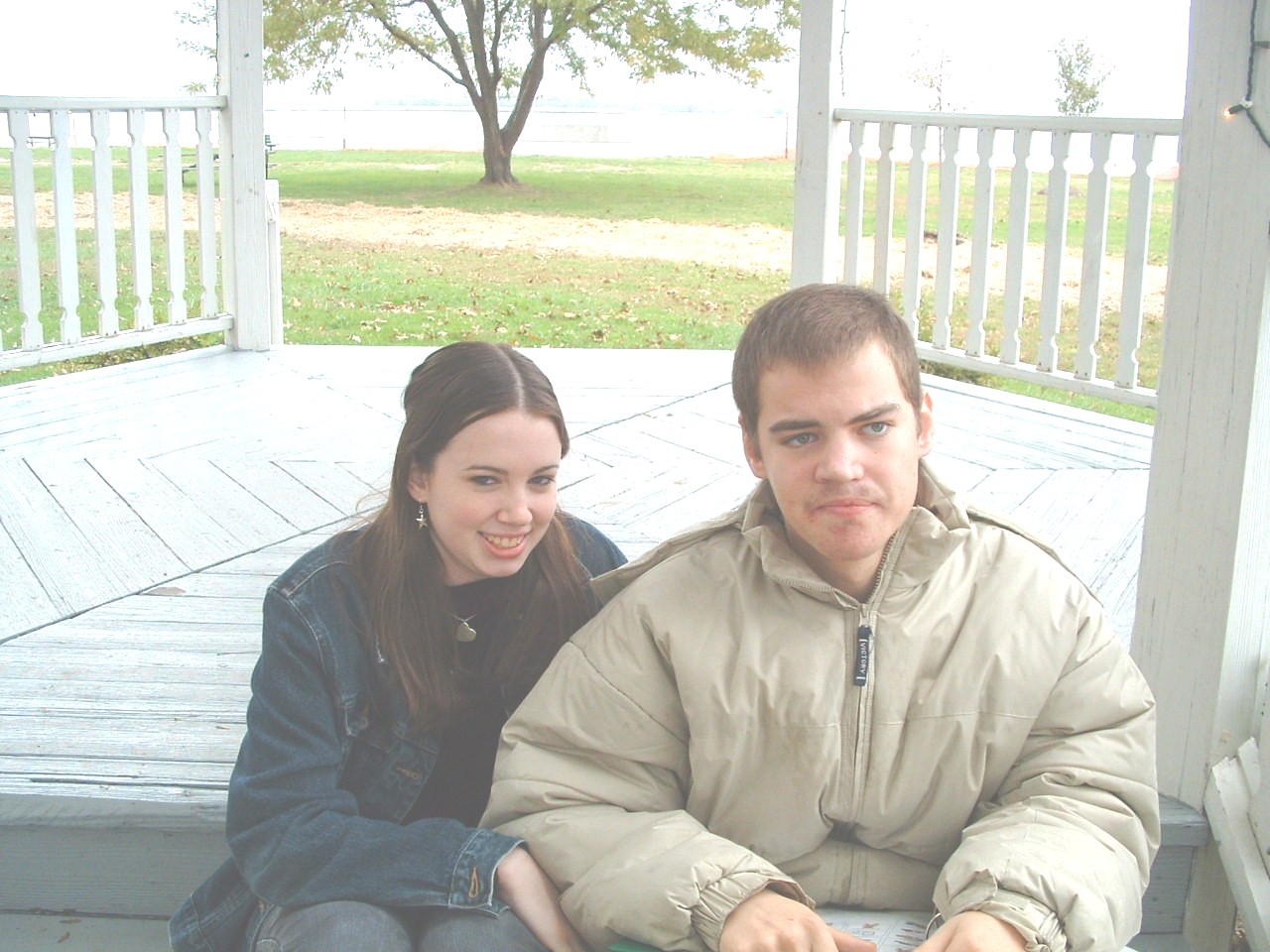
My Brother Eric
An essay by Julie Gallup (November, 2006)
While life can be filled with a multitude of temporary personal bonds, there are some connections that remain constant. The presence of a significant person in your life does not merely influence insignificant decisions, but permanently alters the way you perceive the world, and even the way you live. My brother, Eric, is one of those people. He was diagnosed with autism at age four, which affected his behavior and ability to communicate. Despite his own limitations, he has, in turn, impacted who I am.
Eric has a difficult time accomplishing relatively simplistic tasks, such as tying shoes or brushing teeth. Through repetition and guidance, I helped him begin to accomplish these challenges. Simultaneously, he taught me patience, understanding, and a different approach to situations that, at first glance, seem to have only one possible outcome.
Since he cannot vocally express himself, Eric uses a book filled with words, pictures, and letters. Once my brother mastered using this communication tool, he was able to clearly convey his needs to us, and, if the word was not located in the book, improvise. His sheer determination, intelligence, and willingness to learn were inspiring. Through this experience, I also realized how much we take language for granted, and often times use it negatively. From that moment on, I utilized my words constructively.
My brother's appearance does not indicate that he has a disability because he looks perfectly normal. Because of this, when our family would go out into a public place, we would be accompanied by stares, complaints, and laughter if Eric displayed inappropriate behavior. The lack of tolerance I observed throughout the years encouraged me to disregard differences and accept people for who they are.
When Eric became a teenager, he started exhibiting aggressive behavior. With his age came strength, so, unable to control his rage, my parents and I had to lock ourselves in our rooms until he calmed down. Through these episodes, I reminded myself that I still loved my brother and that he could not express the pain he felt any other way. His physical strength increased my mental strength, and, I am now able to deal with the problems that I face in a rational manner.
Although my brother no longer lives at home, the lessons that he has taught me over the years thrive within. Eric's struggles with autism have made me appreciate and focus in on my own abilities, rather than my weaknesses. He has also helped me prioritize the aspects of life that are truly important such as health and family, rather than the extravagant luxuries that are not nearly as vital. Even though Eric will never be able to live independently, I hope that when I am out on my own, I will impact others just as my brother did. I am stronger, more compassionate, and forever changed because of my experience with him.
The Wrongs of Disability
Rights
A composition by Julie Gallup (December, 2006)
Disabled individuals have endured much discrimination from both society as well as the government on a daily basis. Although there have been some steps taken towards equality, it is still a struggle to obtain services that should be granted without question to those in need. Instead of compliance, there is suffering, protests, and lawsuits to gain rights. This, in addition to the public's torments and the difficulties each disabled person faces because of their disorder, creates an overbearing torrent of misery and responsibility, which often cannot be sorted out alone. Who, then, is to guide those who cannot guide themselves down the path of justice?
In 1990, Congress passed the Americans with Disabilities Act, which addresses the status and privileges that the disabled should have access to such as employment, services, and special accommodations. As stated, 'the Nation's proper goals regarding individuals with disabilities are to assure equality of opportunity, full participation, independent living, and economic self-sufficiency.' (Section 12101, 8) To abide by this act, devices were placed in public facilities, including Braille signs, handicapped parking, hearing systems for the deaf, and wheelchair ramps, to serve the disabled. However, these are small measures compared to the major issues regarding the disabled that are still being contended with to this day.
Children with disabilities are permitted to attend school until they are twenty-one years of age under the Disabilities Education Act. Despite this monumental passage to achieving status in society, there are some limitations. Until recently, students had no authority to decide to participate in their 'traditional' graduation at eighteen. Alicia Vitello, a student with Down syndrome at Hanover Park High School, broke that barrier. Her parents, other supporters, and even the White House had to persuade the Board of Education to let Alicia walk in graduation with the classmates she had formed bonds with. 'It is more meaningful for the students to celebrate with their friends, than with strangers a few years later, said state officials.' (Bruno)
When the Act was established, there was no thought given to any emotional attachment or desires that a disabled student might have. Finally, the Board voted and the amended policy was approved. 'The district ... will now offer students with disabilities a choice to attend graduation in the fourth, fifth or sixth year of their high school career.' (Bruno) However, in order to be allowed at graduation, Alicia must complete her requirements for graduation, the requirements that she technically has three more years to conquer.
Places of worship are not even free of contempt. In Bertha, Minnesota, Carol Race brings her children to Mass. One of her sons, Adam, is autistic, and cannot control his behaviors. Other parishioners who do not know about autism urge Mrs. Race to quiet her son when he becomes disruptive. 'They attended Mass...and received a negative reaction from a person seated nearby who asked them to move. At another parish, the pastor chastised Carol Race after Mass for her son's behavior.' (Voth, 9)
The church, which is supposedly a serene and forgiving atmosphere, has become one of uneasiness. 'In..."Guidelines for Celebration of the Sacraments with Persons with Disabilities," the bishops wrote: "Catholics with disabilities have a right to participate...as fully functioning members of the local ecclesial community."' (Voth, 9) Although this is stated in an official document, most onlookers are unaware of the aforementioned statement, the disabilities that others have, and how much it hurts families that get criticized for actions that cannot be controlled.
The Americans With Disabilities Act states: 'It shall be considered discrimination...to fail to provide...paratransit and other special transportation services to individuals with disabilities, including individuals who use wheelchairs...' (Section 12143, A) This Act was dishonored when New Jersey Transit, under numerous accounts, failed to stop for three disabled individuals, and, in some cases, verbally abused them. Lawsuits were filed by: Paulette Eberle, who is blind, Tyrone Lockett, who has cerebral palsy, and Shonda Lewis, who has a spinal cord injury and uses a wheelchair. Although New Jersey Transit claims that it does not mistreat or discriminate against any of its passengers, Lockett, Eberle, and Citizen Action director Phyllis Salowe-Kaye, collected evidence of these incidents through photographs and recordings. '"I am appalled by...the blatant disregard for the laws prohibiting discrimination and the regulations requiring specific steps to provide transit access for persons with disabilities." Salowe-Kaye said.' (Hester)
The events that unfolded in this case are disturbing. A NJ Transit driver would not allow Eberle's guide dog on the bus. '"Drivers have...asked me to muzzle the dog. They asked me what am I going to do if the dog makes a mess on the bus...they are denying us our rightful place in society."' (Hester) In addition, when Eberle tried to get on the bus after this refusal, the driver closed the door and her hand got stuck. He then drove off, pulling her with him several feet. Lewis faced a similar ignorant response. When attempting to board a train in her wheelchair, neither the metal plate, which bridges the gap between the platform and the train, nor any employee assistance was provided. The conductor then told her to "stop playing games" because she was delaying the train. A bus driver denied Lockett access to the bus when he refused to lower the lift, and pulled away defiantly. Many commuters utilize New Jersey Transit's services, and, if this company continues to engage in derogatory actions against the disabled, it is not going to leave a positive impression among their customers.
Disability is agonizing to live with. However, the pains that can be prevented are the attitudes, words, and actions of society in response to these, and other examples of carelessness. Those who are disabled are still human beings and deserve enduring respect. Their needs are often forgotten, and instead, are masked by the stereotypes garnered by their disabilities. There must be more focus on their abilities, and more protest when their rights are not met wholeheartedly. If tolerance is exhibited, our society, as a whole, will benefit.
Works Cited
Americans With Disabilities Act of 1990. U.S. Dept. of Justice. Title 42, Chap. 126, Secs. 12101 - 12213. 1990.
Bruno, Laura. "Hanover Park Board Changes Graduation Rules for Disabled." Daily Record 12 Oct. 2006, 06 Dec. 2006
Hester, Tom. "NJ Transit Sued by Three Disabled Riders for Insensitivity." The Star Ledger 30 Nov. 2006, 06 Dec. 2006
Voth, Irene. "Parishioners with Autistic Children Seek Inclusive Worship Atmosphere." The Beacon 22 Apr. 2004, 10
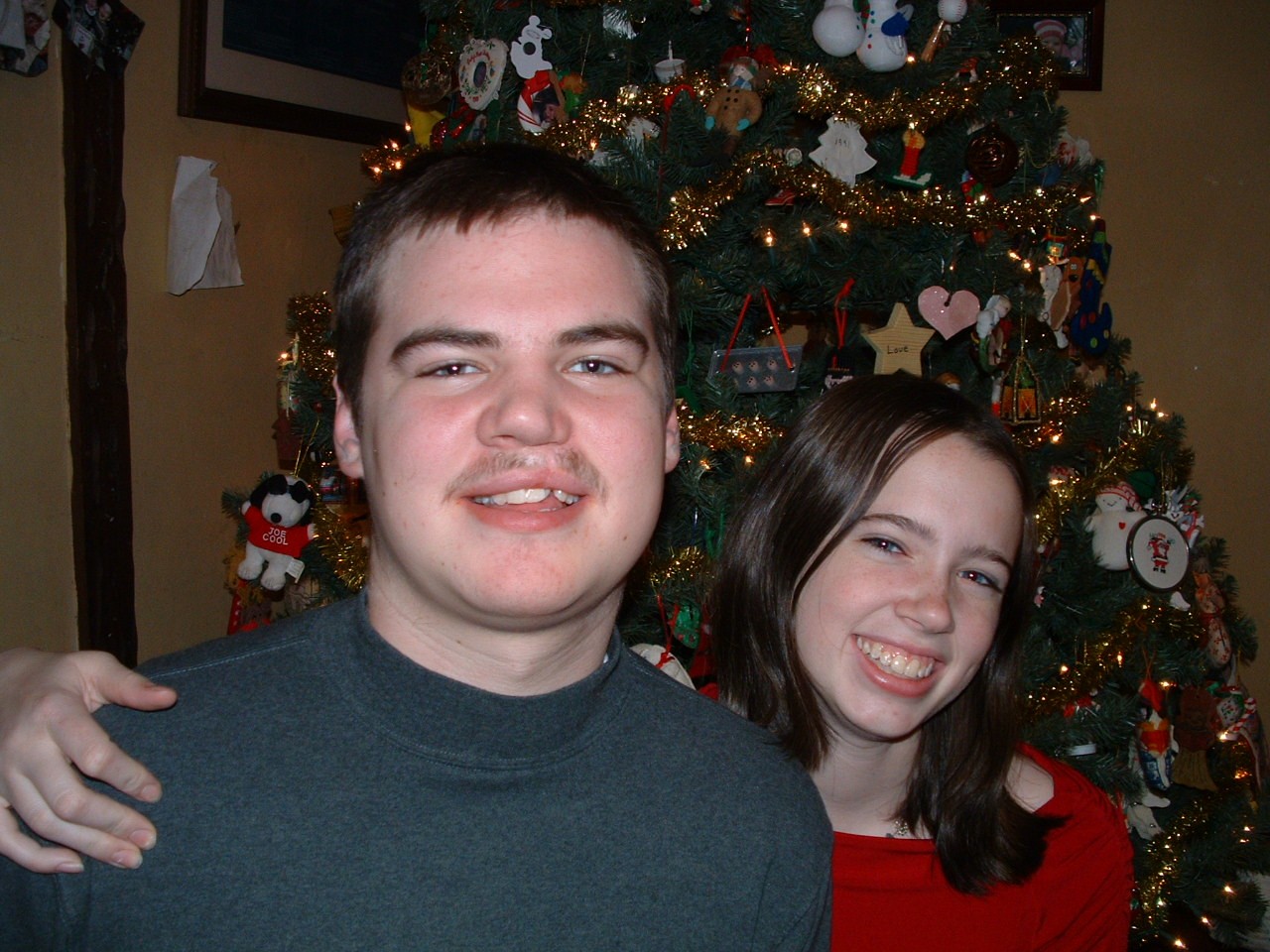
Can Vaccines Cause
Autism?
by Colleen O'Dea of the Daily Record (August 22, 1999)
PARSIPPANY - Eric Gallup
was a typical toddler. He played and laughed and was learning to talk. Like
nearly all other toddlers, he was vaccinated
against measles, mumps and rubella at age 15 months. And he hasn't been the same
since, say his parents.
"I looked at the videos after he was tested (for measles antibodies) in 1995 and
I could see some things changed in him," said Ray Gallup, father of the
14-year-old autistic boy. "His speech was coming on. Then it just
disappeared."
Today, Eric can't speak. He uses a book with pictures and a special machine to
communicate. He attends the Allegro School in Cedar Knolls, a special school for
the disabled. He will probably be able to work but may never live independently.
Ray and his wife Helen are two of the hundreds of parents across the country who
believe an immune system reaction to vaccines caused autism in their children.
And they're trying to fund research to help Eric and other children through a
nonprofit foundation called the Autism Autoimmunity Project, based in
Parsippany.
Still in its first year, the project is trying to raise $50,000 by Oct. 1.
It will hold its first fundraiser, an auction of items donated by sports
figures, celebrities and local merchants, next month.
Autism is a developmental disorder that affects social interaction,
communication, behavior and other brain functions. About 75 percent of the
autistic also have mental retardation, according to the Centers for Disease
Control and Prevention. Autism has been linked to such diseases as encephalitis,
congenital rubella and epilepsy. Some believe genetics play a role in it, but no
one knows what causes most cases and there is no cure.
The CDC says approximately 400,000 people across the country - males more often
than females - are autistic.
According to the U.S. Office of Special Education and Rehabilitation
Services' 20th Annual Report to Congress, the number of autistic students
has risen more than five-fold from 5,415 in 1991-92, the first year autism
was counted as a handicapping condition, to 34,101 in 1996-97. The report
attributes much of the increase to the change in classifying autism, but Dr. F.
Edward Yazbak, a retired pediatrician in Falmouth, Mass., who has two autistic
grandchildren, thinks more children are developing autism at least in part
because of reactions to vaccines.
Like the Gallups, Yazbak believes the measles, mumps, rubella (MMR) vaccine or
other vaccines may play a role in bringing on autism and is frustrated that
there have been no major studies investigating a link.
"There is a relationship that has to be investigated," said Yazbak, also a
member of the Autism Autoimmunity Project. "This is a true tragedy. It's a
true epidemic. We're saying, 'Please, please, people, look at it.'"
A couple of studies by British doctors have come to contradictory
conclusions about a link between autism and vaccines. A 1998 study of a
dozen children found a correlation - but not necessarily a causal
relationship - between the MMR vaccine and autism. The other, published last
June, looked at some 500 and found no link. Each study has been criticized by
one of the sides in the debate.
Many who believe there is a link between vaccination and such disorders as
autism argued for impartial, long-term studies on the effects of vaccines and
their possible relationship to such disorders as autism at an Aug. 3 hearing in
Washington, D.C., by the House Committee on Government Reform, chaired by Rep.
Dan Burton, R-Ind. Burton also has a grandchild whom he believes became autistic
because of a vaccination.
Hardly anyone disputes that vaccines have almost eliminated many formerly common
diseases. State health officials say prior to wide-spread
immunization infectious diseases - such as rubella, measles and polio -
killed or disabled thousands of children every year.
People like Yazbak fully support vaccinations but believe that bombarding an
infant or toddler's immune system with so many vaccines at once can be harmful.
He suggests spreading the vaccines out over a longer period of time.
"Where are the safety studies on the short or long term effects of the
interaction of numerous multiple vaccinations on the developing brain and
immune system of our children?" asked Rick Rollens, of Granite Bay, Calif.,
whose 8-year-old son Russell began to show autistic tendencies at 7 months old,
after receiving his third DPT (diphtheria, pertussis and tetanus) and first HIB
(Haemophilus influenzae B) vaccinations.
"Many safety studies of individual vaccines only include a few days
follow-up period for reactions but the CDC tells parents and the media that the
onset of autism after vaccination could only be an 'unrelated chance
occurrence.' Show me the science," Rollens said.
Doctors at the University of Medicine and Dentistry of New Jersey found
measles' antibodies nearly 10 times higher than normal in Eric and
discovered similarly high levels in 16 other children, Gallup said.
In an unpublished abstract, the doctors - including Dr. James Oleske, a
renowned pediatric AIDS specialist - concluded "MMR therefore may play a
role in the pathogenesis of autism."
Dr. Michael Gerber, a professor of pediatrics at the University of
Connecticut School of Medicine and a member of the American Academy of
Pediatrics' Committee on Infectious Diseases that evaluates new vaccines, said
he is not aware of the UMDNJ findings and can't explain them. But he said no
other study of which he is aware has been able to document a correlation.
"Just because a child gets an MMR at 1 year of age and at 14 or 15 months is
diagnosed autistic does not mean there's a causal relationship," Gerber said.
"As for these theories, there is either no evidence to support them or people
have been unable to corroborate the evidence presented."
In a paper on autism and vaccines, the CDC also states there is "no
convincing evidence that any vaccine can cause autism or any kind of
behavioral disorder." It cites three studies, none by doctors in the United
States, that found no link.
Between January 1990 and February 1998, only 15 cases of autism after
vaccination were reported to the national Vaccine Adverse Events Reporting
System, according to the CDC. It concluded those cases "are likely to represent
unrelated chance occurrences that happened around the time of vaccination."
The CDC is conducting a study in the Atlanta area to further evaluate any
link between autism and the MMR. That is expected to be completed some time next
year.
But none of this information has quieted parents' fears.
The National Vaccine Information Center, Autism Research Institute and Cure
Autism Now all continue to call for independent, non-governmental studies.
"Parents are reporting to our organization in record numbers that their
children are becoming autistic after vaccination," said Barbara Loe Fisher,
co-founder and president of the National Vaccine Information Center.
New Jersey law requires all children to be vaccinated against 10 diseases
before they can enter school. They need to receive at least 16 shots or
vaccination doses by age 2 and get some boosters later.
Gerber maintained that today's vaccines are very safe.
"Nothing we do in medicine is 100 percent safe, but the risk involved in
getting a vaccine today is lower than it's ever been and it continues to be
much less than getting the disease," he said.
But to activists like Rollens, Gallup and Yazbak, such assurances are not
enough.
"We want the science," said Gallup, an accountant who is putting countless hours
into the Autism Autoimmunity Project. "We're hoping our small organization with
other people in other organizations across the country can get something started
on this."
In May, New Jersey set aside $1.5 million to fund the Governor's Council for
Medical Research and Treatment of Infantile Autism at UMDNJ. California
appropriated $5 million for autism research to a private institute.
"Little biomedical research has been done on autism," said Gov. Christie
Whitman in enacting the new project. "(This) will help get that critical
research under way."
Gallup hopes his group can raise at least $50,000 toward research and hopes its
advocacy for testing will help raise funds and public awareness.